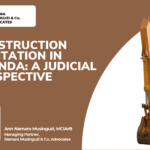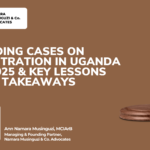Vantage Mezzanine Fund II Partnership & Another v Commissioner Land Registration & 7 Others, Misc. Application No 2484 of 2023
Attention!
Section 6 of the Arbitration and Conciliation Act Cap 6 is not a bar to Court exercising its inherent powers under section 98 of the Civil Procedure Act Cap 71 and section 33 of the Judicature Act Cap 13 to grant post award protective measures
Background to the case.
This was an application for an interim protective measure made pursuant to section 6 of the Arbitration and Conciliation Act (ACA) Cap 6 and Rule 6 of the Rules thereunder. Briefly, it sought an order restraining the 1st Respondent from taking any actions in respect to the certificates of title that the 2nd to 7th Respondents had mortgaged to the Applicants. They also sought an order restraining the 8th Respondent from registering any alterations to the company documentations of the 2nd to 5th Respondent because the company documentation constituted further security as share pledges. This application was premised on Arbitration Cause No. 72/2023 which the applicants had filed for recognition and enforcement of the arbitral award rendered in their favour against the 2nd to 7th Respondents. It was the applicant’s contention that in the event that the interim protection measure was not granted, then their application for recognition and enforcement, if granted, would be rendered moot because they would have no security to enforce. The Respondents opposed the application and one of the major grounds of objection raised was that arbitration proceedings between the applicants and 2nd to 7th Respondents had since terminated and it therefore followed that the Applicants could not obtain interim protective measures. The High Court (Thomas Ocaya, J) in granting the application held inter alia as follows:
- Section 6 of the ACA provides for the grant of interim protective measures before and during arbitration proceedings. It does not extend to after arbitration proceedings have been closed and an award delivered.
- Notwithstanding the limitation encapsulated in section 6 of the ACA, the High Court has the discretion to invoke its inherent powers under section 98 of the Civil Procedure Act (CPA) and section 33 of the Judicature Act to grant any order necessary to ensure that the ends of justice are met.
- It therefore followed that in the instant application, the Court could invoke its inherent powers and grant the interim protective measure pending the determination of the application for recognition and enforcement of the arbitral award.
Effect of the judgement
The Court departed from its earlier decision of Great Lakes Energy Company NV v MSS Xsabo Power Limited & 4 Others, Misc. Application No 1041/2023 (arising from Misc. Cause No. 0017/2021) wherein when faced with an application for variation of interim orders of protection until the determination of the Applicant’s appeal against the dismissal of its application for recognition & enforcement of its arbitral award stated that whilst Court should ensure that it stays within the confines legally permissible for it to intervene in arbitral proceedings, the London Court of International Arbitration (LCIA) Rules provided for determination of arbitral proceedings once a final or additional award was issued. It therefore followed that an arbitration would only be considered “determined” after the expiration of time stated in the LCIA rules for the application of the correction of a final award and rendering additional awards.
Both decisions fundamentally departed from the Supreme Court decision in the case of Babcon Uganda Limited v Mbale Resort Hotel Ltd, SCCA No. 6/2016 where the Supreme Court considered the intention behind the drafting of the ACA, in dismissing the appeal which was premised on dissatisfaction of a decision arising from section 34 of the ACA. The Supreme Court emphasized that the intention, as contained in Mr. Justice Harold Platt’s Commission of Inquiry Report was the need to incorporate into our international instruments and introduce radical provisions which will give arbitration the importance it plays in other jurisdictions. One of the “radical provisions” was Section 34 of the ACA which provides for specific grounds for setting aside an arbitral award and limits appeals from arbitral awards to only instances where the parties have consented to the appeal and Court subsequently grants leave to appeal.
The overarching effect therefore is that interim protective measures can now be extended past the finality of an arbitral award on the basis of Court’s exercise of its discretion as discussed herein. This introduces the concept of “post award protective measures”.
Concluding Observationas
Whereas it is most pertinent that Court orders when rendered are not rendered in vain and should therefore be enforceable, Section 9 of the ACA provides for limited interference of Courts in arbitral matters save for instances that are specifically listed in the ACA. The ACA provides for the finality of an arbitral award and does not clothe the Courts with the discretion to issue post award protective measures. Further, there is lack of clarity from the two High Court decisions discussed herein on what amounts to a final arbitration award and the specific powers of the Court.
There is a high likelihood that the non-interference of Courts, as envisaged by the ACA, is now subject to its discretion as stated in the CPA. This shall completely compromise the sanctity of arbitration and its finality.
Disclaimer: No information contained in this alert should be construed as legal advice from Namara Musinguzi & Co. Advocates or the individual authors, nor is it intended to be a substitute for legal counsel on any subject matter
Prepared By:
Ann Namara Musinguzi (Managing Partner)
ann@namaralaw.com



